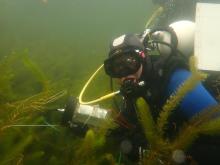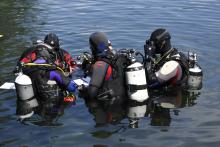Students at TU Bergakademie Freiberg can train to become certified scientific divers. In doing so, they not only improve their diving skills, but also learn how to work with scientific equipment and measuring instruments. The certificate is an additional qualification for practical work, for example in the assessment of dams or structures under water, in the exploration of post-mining landscapes or in the development of measuring and monitoring devices.

Nine students from different degree programmes took part in two multi-day diving camps in June in the course "scientific diving I". During the excursion to a quarry and a reservoir around Freiberg, the participants are prepared for the completion of their scientific diving training.
"The participants consolidate the necessary practical skills for an effective and safe dive," says Thomas Grab, coordinator of the Scientific Diving Centre at TU Freiberg. In the group, the participants learn how to lay and map measuring and observation points, how to record thermal and hydrochemical parameters with suitable measuring instruments or how to take qualified water samples.
"In order to prepare for their work in the water, the participants familiarise themselves with the individual hand movements and tasks in advance. This is helped by the two-semester training in the swimming hall, where basics such as photo documentation or mapping under water, knots and rescue techniques, as well as working with scientific equipment such as a lifting bag are learned," says training manager Thomas Pohl.

Exploring the Adriatic Coast
During the diving camps and the final excursion to the Croatian Adriatic coast, the freshly trained scientific divers practically apply what they have learned. "Students and external participants come together in an interdisciplinary research team. It's a great experience!" says Thomas Pohl. "Together we investigate the influence of tourism on the coastal region, test underwater measuring instruments and improve investigation methods, such as underwater photogrammetry."
The participants examine and visualise the results of their dives on the computer. Depending on the question, they create 3D models of hidden objects or the nature of the subsoil, for example.
Certificate in Scientific Diving
About the Scientific Diving Center
The Scientific Diving Center (SDC) at TU Bergakademie Freiberg was founded in 2001. Since then, it has established itself as one of the leading scientific diving facilities in Europe. It organises and conducts research and university activities in the various fields of underwater research.
Scientific diving involves the application of scientific working methods at different levels and fields of application in physics, chemistry, biology, geosciences, fluid mechanics, thermodynamics and engineering.